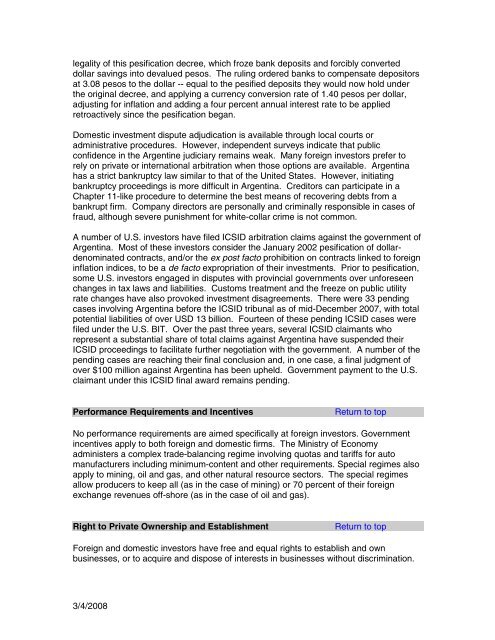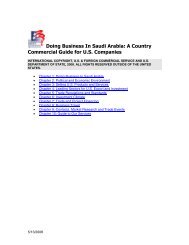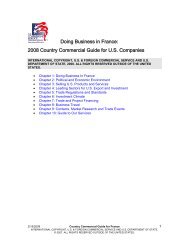You also want an ePaper? Increase the reach of your titles
YUMPU automatically turns print PDFs into web optimized ePapers that Google loves.
legality of this pesification decree, which froze bank deposits and forcibly converted<br />
dollar savings into devalued pesos. The ruling ordered banks to compensate depositors<br />
at 3.08 pesos to the dollar -- equal to the pesified deposits they would now hold under<br />
the original decree, and applying a currency conversion rate of 1.40 pesos per dollar,<br />
adjusting for inflation and adding a four percent annual interest rate to be applied<br />
retroactively since the pesification began.<br />
Domestic investment dispute adjudication is available through local courts or<br />
administrative procedures. However, independent surveys indicate that public<br />
confidence in the Argentine judiciary remains weak. Many foreign investors prefer to<br />
rely on private or international arbitration when those options are available. <strong>Argentina</strong><br />
has a strict bankruptcy law similar to that of the United States. However, initiating<br />
bankruptcy proceedings is more difficult in <strong>Argentina</strong>. Creditors can participate in a<br />
Chapter 11-like procedure to determine the best means of recovering debts from a<br />
bankrupt firm. Company directors are personally and criminally responsible in cases of<br />
fraud, although severe punishment for white-collar crime is not common.<br />
A number of U.S. investors have filed ICSID arbitration claims against the government of<br />
<strong>Argentina</strong>. Most of these investors consider the January 2002 pesification of dollardenominated<br />
contracts, and/or the ex post facto prohibition on contracts linked to foreign<br />
inflation indices, to be a de facto expropriation of their investments. Prior to pesification,<br />
some U.S. investors engaged in disputes with provincial governments over unforeseen<br />
changes in tax laws and liabilities. Customs treatment and the freeze on public utility<br />
rate changes have also provoked investment disagreements. There were 33 pending<br />
cases involving <strong>Argentina</strong> before the ICSID tribunal as of mid-December 2007, with total<br />
potential liabilities of over USD 13 billion. Fourteen of these pending ICSID cases were<br />
filed under the U.S. BIT. Over the past three years, several ICSID claimants who<br />
represent a substantial share of total claims against <strong>Argentina</strong> have suspended their<br />
ICSID proceedings to facilitate further negotiation with the government. A number of the<br />
pending cases are reaching their final conclusion and, in one case, a final judgment of<br />
over $100 million against <strong>Argentina</strong> has been upheld. Government payment to the U.S.<br />
claimant under this ICSID final award remains pending.<br />
Performance Requirements and <strong>In</strong>centives Return to top<br />
No performance requirements are aimed specifically at foreign investors. Government<br />
incentives apply to both foreign and domestic firms. The Ministry of Economy<br />
administers a complex trade-balancing regime involving quotas and tariffs for auto<br />
manufacturers including minimum-content and other requirements. Special regimes also<br />
apply to mining, oil and gas, and other natural resource sectors. The special regimes<br />
allow producers to keep all (as in the case of mining) or 70 percent of their foreign<br />
exchange revenues off-shore (as in the case of oil and gas).<br />
Right to Private Ownership and Establishment Return to top<br />
Foreign and domestic investors have free and equal rights to establish and own<br />
businesses, or to acquire and dispose of interests in businesses without discrimination.<br />
3/4/2008












